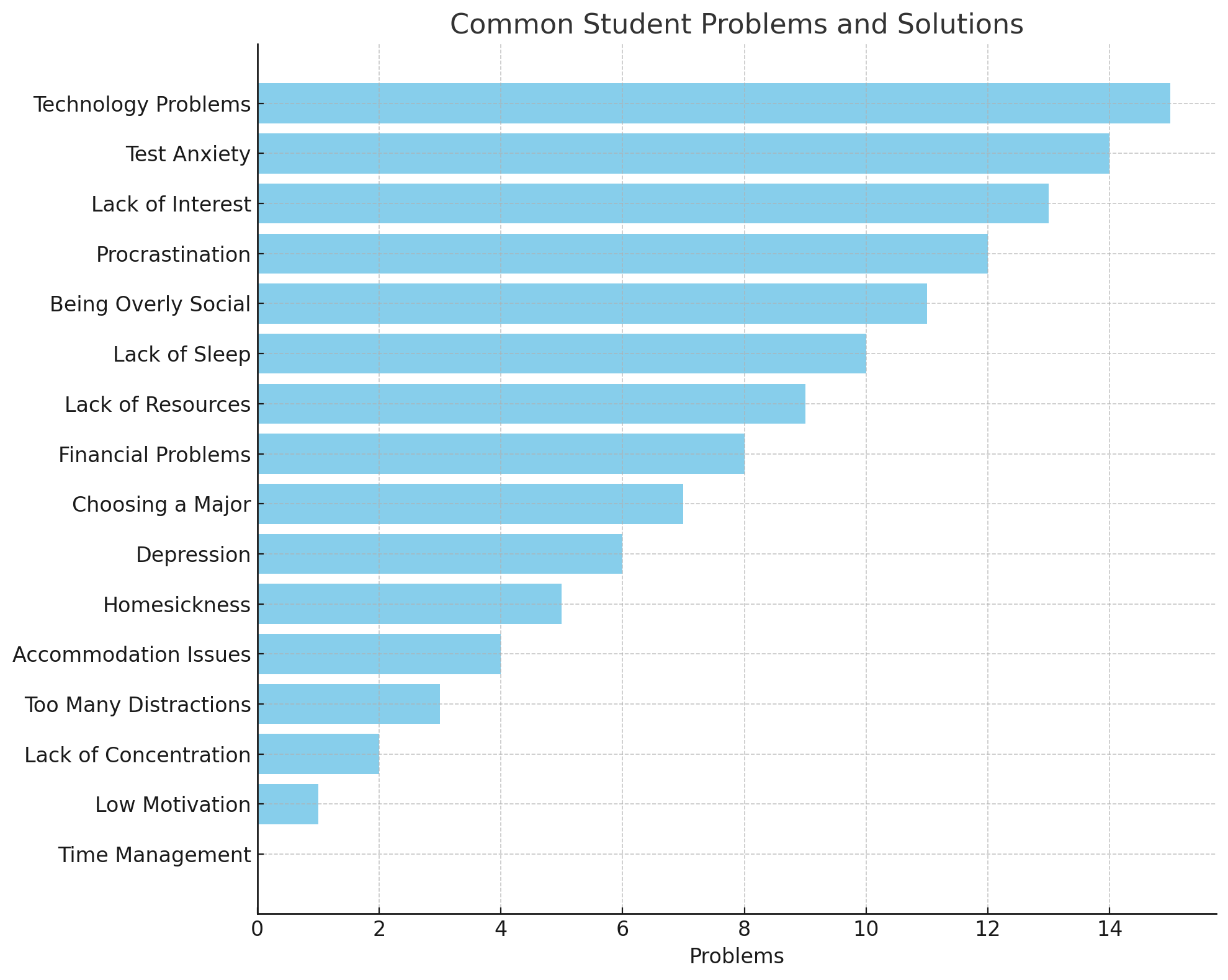
As an educational counselor who has worked with students for over a decade, I've seen firsthand how student challenges have grown more complex. Just last week, my student Sarah sat in my office, her hands wrapped around a cup of tea, sharing her struggles.
"Some days, it feels impossible to keep up with everything," she said, voicing what many students experience.
My years of experience helping students like Sarah have shown me that while each person's journey is unique, many face similar challenges. Recent research from the American Psychological Association (2024) shows that 71% of students report higher stress levels than ever. But here's what I've learned: understanding these challenges is your first step toward handling them better.
I'm writing this guide to share what I've learned from working with hundreds of students, combined with the latest research and proven solutions. Whether you're dealing with study stress, money worries, or finding balance, you'll find practical help here.
Table of Content
Academic Challenges and Study Stress
Managing Course Loads
I often meet students like James, a junior taking five AP classes, during my counseling sessions. Last month, he told me, "I love learning, but sometimes I can't remember the last time I got a full night's sleep." The Yale Center for Emotional Intelligence (2024) backs up James's experience—their research shows that 83% of students name academic work as their main source of stress.
Here's what I've noticed causes the most pressure:
- Multiple deadlines hitting at once
- Complex projects requiring extensive research
- Balancing different subject requirements
- Finding time for deep learning versus surface studying
From my experience, helping students plan their studies and breaking down big tasks helps tremendously. When Emily, another student I work with, started dividing her assignments into 30-minute chunks, she saw immediate improvements in her work quality and stress levels.
Test Anxiety and Performance
"My mind goes blank as soon as I see the exam paper," Miguel told me during one of our sessions. This is something I hear often, and research from the Anxiety and Depression Association (2024) shows that 40% of students experience severe test anxiety.
Based on my work with students, here are effective strategies that work:
- Practice tests under timed conditions
- Regular study sessions instead of cramming
- Deep breathing exercises before exams
- Creating detailed but manageable study plans
Mental Health and Emotional Wellbeing
Dealing with Stress and Anxiety
The American College Health Association's 2024 report revealed something that matches what I see in my office - 44% of students show signs of depression. Alex, an engineering student I counseled, initially came to discuss dropping grades. Only after several meetings did he share his struggle with anxiety.
From my experience, these signs often show up first:
- Changes in sleep patterns
- Loss of interest in favorite activities
- Difficulty focusing in class
- Feeling overwhelmed by regular tasks
Building Healthy Habits
Working with students has taught me that small changes make big differences. The Sleep Foundation (2024) reports that 67% of students don't get enough sleep, affecting their learning and mental health.
Tips I share with my students that work:
- Set a regular sleep schedule
- Take short breaks between study sessions
- Find physical activities you enjoy
- Connect with friends regularly
Digital Learning and Technology
Screen Time Balance
"I spend so much time online for classes that my eyes hurt," shared Lisa, a sophomore I counsel. The Digital Wellness Institute (2023) found students check their phones about 96 times daily. Through my work, I've seen how this affects concentration and learning.
Practical solutions I've developed with my students:
- Using the 20-20-20 rule (look 20 feet away every 20 minutes)
- Setting specific times for social media
- Creating phone-free study zones
- Using apps that track and limit screen time
Online Learning Effectiveness
Based on my experience helping students adapt to online classes, the structure makes a huge difference. EdTech Magazine (2024) reports that 73% of students struggle with online learning focus.
Methods that have worked for my students:
- Creating a dedicated study space
- Using time-blocking techniques
- Taking active notes during online lectures
- Participating in virtual study groups
Financial Pressures and Solutions
Managing Education Costs
The Federal Reserve (2024) reports that the average student loan debt reached $37,574. I've counseled many students like Maria, who works two part-time jobs while studying full-time. The Hope Center's 2023 research shows that 36% of students face food insecurity.
Practical financial strategies I recommend:
- Researching scholarship opportunities early
- Creating detailed monthly budgets
- Looking for work-study programs
- Using student discounts and resources
Balancing Work and Study
The Bureau of Labor Statistics (2024) shows that 43% of full-time students work part-time. Jenny, a nursing student I work with, manages 20 weekly work hours while studying. Here's what helps:
- Strategic course scheduling
- Communication with professors about work commitments
- Using campus resources effectively
- Finding flexible work opportunities
Social Development and Relationships
Building Connections
The Journal of College Student Development (2023) found that 58% of students struggle with maintaining relationships while studying. Through my counseling work, I've seen how isolation affects academic performance.
Success strategies I've seen work:
- Joining study groups
- Participating in campus clubs
- Scheduling regular social time
- Building support networks
Time Management Skills
Working with hundreds of students has shown me that time management can make or break academic success. The Academic Success Center (2024) reports that 87% of students struggle with time management.
Effective methods I teach:
- Using digital calendars for planning
- Breaking large projects into smaller tasks
- Setting specific study goals
- Creating weekly schedules
Solutions and Support Systems

Getting Help When Needed
Research from the Journal of Counseling Psychology (2024) shows students using counseling services improve their academic performance by 31%. I always tell my students what I told Alex: "Asking for help is a sign of strength, not weakness."
Available resources include:
- Academic advisors
- Mental health counselors
- Study skills workshops
- Peer tutoring programs
Building Resilience
Through my years of counseling, I've learned that resilience comes from having the right support and strategies. The Education Advisory Board (2024) found universities with comprehensive support systems have 27% higher student success rates.
Proven approaches include:
- Setting realistic goals
- Developing stress management techniques
- Building strong support networks
- Celebrating small wins
Moving Forward
Remember what I tell all my students: challenges are normal, but don't define your journey. Every student I've worked with has unique strengths and faces different obstacles—the strategies and insights I've shared come from real experiences helping students overcome similar challenges.
If you're struggling, reach out for help. Your school likely has resources available, and there's always someone ready to support you. From my experience, the students who succeed aren't necessarily the smartest or most talented - they're the ones who learn to use their resources and ask for help when needed.
You have what it takes to succeed in your academic journey. Start with one small step today, whether it's creating a study schedule, talking to a counselor, or connecting with a study group. Your future self will thank you for it.
[Note: This article reflects personal counseling experience combined with current research. Always verify statistics and consult with academic advisors for personalized guidance.]





